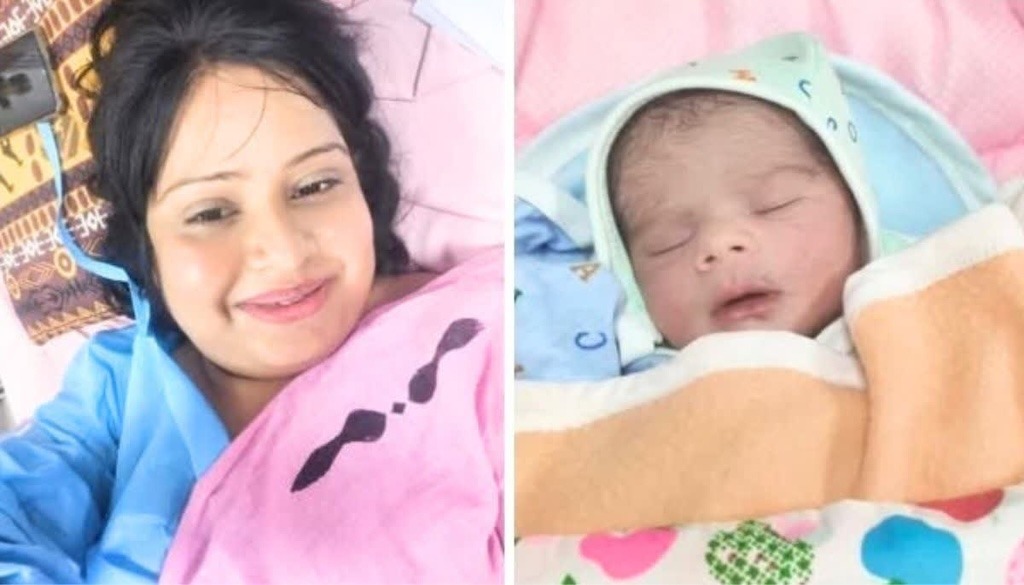
The world of Bhojpuri music has been buzzing with surprising news. Popular Bhojpuri singer Devi, who is unmarried, has recently given birth to a healthy child. The delivery took place at AIIMS Rishikesh, where doctors confirmed that Devi conceived through in vitro fertilization (IVF) with the help of donor sperm obtained from a sperm bank in Germany.
Her decision to become a mother without marriage has sparked intense discussions on social media. Many people are curious about how unmarried women can legally and medically become mothers in India. Experts have stepped forward to explain the process, regulations, and the role of modern medical science in enabling such choices.
Devi’s Bold Step Towards Motherhood
Devi is a well-known Bhojpuri playback singer who enjoys a strong fan following. She made headlines by sharing her photo with her newborn child on social media platforms.
What makes her case unique is her unmarried status. Traditionally, Indian society associates motherhood with marriage. Devi, however, chose a different path by using advanced reproductive technologies to fulfill her desire for motherhood.
Her pregnancy was made possible through IVF treatment, where sperm from a German sperm bank was used. The embryo was created in a lab and then implanted into her uterus. After a successful pregnancy, she delivered a healthy baby at AIIMS Rishikesh.
IVF Technology Explained
IVF, or in vitro fertilization, is a medical process designed to help women conceive. It involves retrieving eggs from a woman’s ovaries and fertilizing them with sperm in a laboratory. Once embryos form, they are transferred to the woman’s uterus, leading to pregnancy if implantation is successful.
According to IVF specialists, the process is safe, effective, and widely used around the world. It offers hope not only to infertile couples but also to unmarried women, widows, and divorcees who wish to become mothers independently.
Devi’s case is an example of how reproductive technologies empower women to make personal choices regarding motherhood without relying on traditional marital setups.
Legal Framework: ART Regulation Act 2021
In India, the Assisted Reproductive Technology (Regulation) Act 2021 governs the use of IVF and related treatments. The law clearly allows unmarried women, widows, and divorcees to undergo IVF procedures.
Dr. Sonali Gupta, a former gynecologist and IVF specialist at Fortis Hospital Greater Noida, explained that women are legally entitled to use donor sperm from certified sperm banks. This makes the process legitimate and regulated under Indian law.
The Act ensures safety, ethical practices, and accountability for both patients and medical institutions. By using donor sperm or donor eggs, women can legally and medically achieve motherhood.
How IVF Works for Unmarried Women
For an unmarried woman, the IVF journey starts with medical evaluations to ensure readiness for pregnancy. Eggs are retrieved from the woman’s ovaries and fertilized with donor sperm in a lab. The resulting embryo is transferred into her uterus, where it can develop naturally.
If pregnancy occurs, the process is medically no different from natural conception. The child is biologically related to the mother because her eggs were used, while the donor sperm provides the paternal contribution.
This method allows unmarried women like Devi to experience motherhood without the traditional requirements of marriage or a male partner.
Donor Sperm and the Role of Sperm Banks
Devi’s case drew attention because the sperm came from a German sperm bank. Sperm banks maintain frozen samples from donors, screened for genetic and medical conditions.
In India, certified sperm banks also exist, but many women choose international banks for greater anonymity or wider selection. Donors remain confidential, and women can choose characteristics like ethnicity, health background, or physical traits.
By using donor sperm, women ensure safe conception while following legal and ethical protocols.
Age and IVF Success Rates
Doctors emphasize that the success of IVF strongly depends on the woman’s age. Women between 20 and 30 years usually have the highest success rates. After 35, the chances of successful pregnancy decline, and by 40, IVF becomes more challenging.
Dr. Sonali Gupta explained that older women sometimes need donor eggs if their own eggs are not viable. This involves fertilizing eggs from another woman with donor sperm and implanting the embryo in the intended mother’s uterus.
For women like Devi, who opted for treatment at a younger age, the chances of a healthy pregnancy were significantly higher.
Social Reactions and Public Debate
Devi’s decision to become a single mother has sparked debate across India. Many praised her courage to break social norms and embrace motherhood on her own terms. Supporters argue that women must have the freedom to choose how and when they want to become mothers.
However, some criticized her choice, claiming that motherhood should remain within the framework of marriage. This reflects the cultural divide between traditional beliefs and modern lifestyle choices.
Despite criticism, Devi’s story highlights the growing acceptance of IVF and assisted reproduction in India. It demonstrates how technology is reshaping social perceptions about family and parenthood.
IVF and the Changing Face of Parenthood in India
India has seen a steady rise in the use of IVF treatments over the last two decades. Couples facing infertility are no longer the only group seeking treatment. Increasingly, unmarried women, widows, and divorcees are turning to IVF for motherhood.
The introduction of the ART Regulation Act 2021 has provided legal backing for these decisions. It ensures that women like Devi can choose motherhood without fear of stigma or illegality.
This trend reflects broader societal changes, where individual choices are gaining recognition over traditional norms. Parenthood is slowly being redefined as a personal right rather than a cultural obligation.
Medical Safety and Ethical Considerations
Doctors emphasize that IVF is a safe and scientifically established method. Modern medical infrastructure, strict screening of donors, and advanced technology ensure minimal risk.
Ethical guidelines require sperm banks and fertility clinics to maintain confidentiality. Donors remain anonymous, and patients’ rights are protected under law.
This framework ensures that women undergoing IVF, whether married or unmarried, receive equal medical care and dignity throughout the process.
Devi’s Case as an Inspiration
Devi’s bold step may inspire other women to explore options like IVF. For many, the fear of social judgment has been a barrier. With prominent public figures openly embracing unmarried motherhood, perceptions are bound to change.
Her story proves that motherhood is a personal choice, achievable through science, courage, and determination. It also shows that women no longer need to compromise their dreams of parenting due to marital or social constraints.
The Future of IVF in India
The demand for assisted reproductive technologies is expected to rise in the coming years. Awareness, legal clarity, and reduced social stigma will drive this growth. More women, both married and unmarried, are likely to turn to IVF for achieving parenthood.
Healthcare experts predict that India will soon see more openness toward single motherhood. With improved technology and affordable treatments, the dream of having children will become accessible to more women.
Bhojpuri singer Devi’s journey to motherhood through IVF has sparked conversations across India. By choosing to become a single mother using donor sperm from Germany, she challenged traditional norms and showcased the possibilities of modern science.
Her case highlights the legal backing provided by the ART Regulation Act 2021, which allows unmarried women to pursue IVF. It also emphasizes the safety, success, and growing acceptance of assisted reproductive technology in India.
Devi’s decision is not only a personal milestone but also a symbolic moment for women’s empowerment. It demonstrates how science and courage can combine to redefine motherhood in the modern era.
As discussions continue, her story will remain an example of personal freedom, medical advancement, and the changing face of Indian society.


